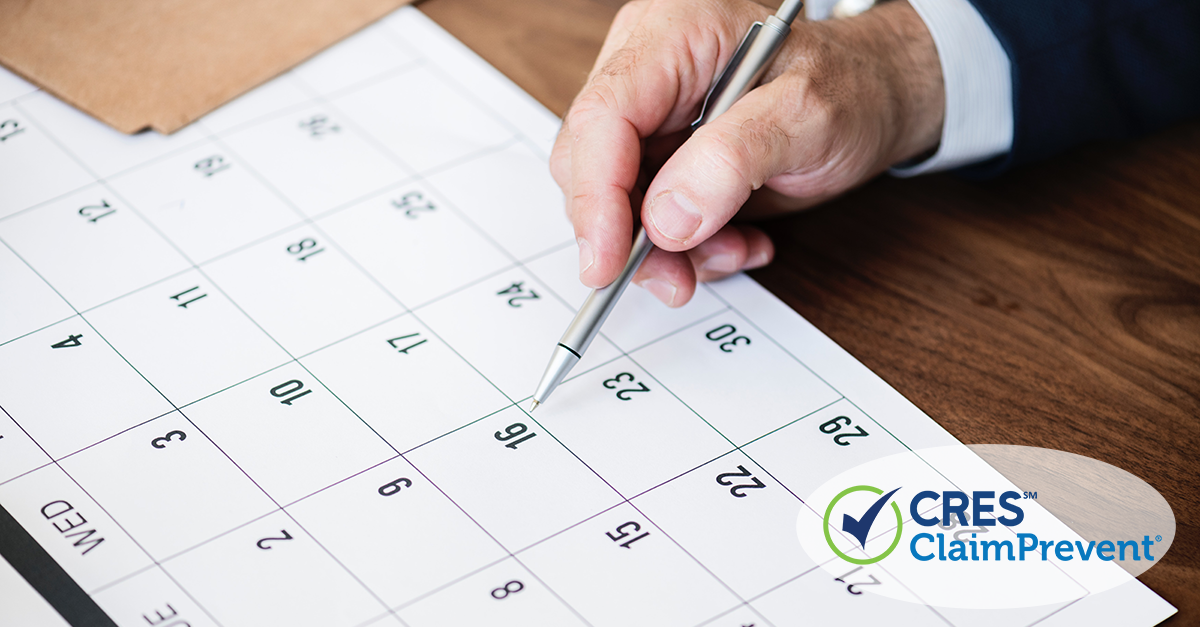September is real estate licensee Safety Month — an ideal time to reflect on the safety of your real estate business. Whether it’s just you — or you have a team, it’s a good idea to put protective measures in place to ensure your own security, as well as that of your team and clients
The largest risk for real estate agents centers around open houses and showings. Are you protected if a prospect is injured during an open house? Are you protected if property damage occurs?
What about protection against ID and transaction fraud?
Failure to have sufficient protection for these safety issues can put not only the business at risk but also your physical person and personal assets. Here are some tips to manage your risks and to keep you, your team, and your prospects safe this September — and every month in your real estate business.
Make Sure Your Open House is a Safe Space
Physically audit the home well ahead of your event to ensure there aren’t any hazards which could be potential risks to you or your prospects. Look for tripping hazards — garden tools in the yard, items near doorways, spills or lifting carpet. Make sure the power is available, lights are on and curtains or blinds are open so the property is well lit and no one can fall back on an “I can’t see!” excuse.
Advise the property owners to remove valuables before the open house. This will prevent any opportunistic thieves from taking advantage of personal effects on show. It will also help to reduce your risk of potential accusations if something goes missing.
Remind your sellers to remove any reminder notes they have posted about passwords.
Check-In Prospects Before Entering the Open House
Meet prospects at the door, and ask them to sign in before touring the property. Ask visitors to complete an ID form and record their full name, address, telephone number, and email. Take a photocopy of their driver’s license if you can, or ask to see the license and record the license number.
If you’re arranging a showing for a buyer you haven’t met before, collect this information in advance of showings, to reduce your risk of liability in the unfortunate case of theft or damage.
Avoid Property Damage After You Leave
Before leaving the open house, check all rooms and the back and front yards. Lock all doors and windows. If the property owners aren’t returning to the home immediately after the open house, draw all curtains and blinds, so outsiders can’t see their belongings through the window.
After each showing where the listing agent isn’t present, be sure you lock each door you opened. If you’re using a lockbox, be sure the box is secure after you replace the key. You don’t want to face a lawsuit because someone enters the home illegally and wrecks the place after you leave.
Be Aware of Transaction Fraud Risks
Transaction fraud is a growing area of concern in the real estate industry. Scammers can use your personal information to set up fictitious listings in an effort to dupe potential buyers. They can hack into emails and send fake deposit requests to clients. Or they can clone business websites to fraudulently collect payments.
Make it clear to your clients what your process is for collecting deposits and payments so they cannot be scammed. Advise them to always call you at the number on your business card, to verify EVERY change in wire instructions.
Learn more about protecting yourself from cybersecurity risks.
Shield your computers from viruses by not clicking on attachments from unknown contacts. Advise everyone on your team to do the same.
Protect your Personal Info
According to the NAR 2017 Member Safety Report, only 1% of real estate licensees surveyed have fallen victim to identity theft. Although identity theft is relatively rare, protecting your personal information is essential to keep identity thieves at bay.
Real estate agents must have personal contact details and photographs in the public domain as a means of marketing their business. Showcase only the minimum amount of information possible. Avoid discussing where you live, middle names, plans for vacation, and other personal details in front of clients.
Monitoring your credit report and placing fraud alerts when necessary can also add to your personal security. Fraud alerts automatically notify you if there are any changes to your accounts, or if there is an attempt to create a new account under your name. Learn more about real estate broker identity theft.
Manage the Risks
Check your insurance policy to make sure you’re fully protected. CRES real estate E&O + ClaimPrevent® policies offer comprehensive coverage tailored specifically to real estate. Policies include Open House and Showings coverage, which will cover property damage, as well as injury to your prospects and visitors.
Every policy also includes Legal Advisory Services seven days a week. That means if you come across an issue and you need some legal guidance, you can contact CRES at no extra charge. With 20+ years’ experience protecting real estate agents and brokers, CRES wants to protect your real estate business as much as you do. Contact the toll-free number 800.880.2747 to find out more.
